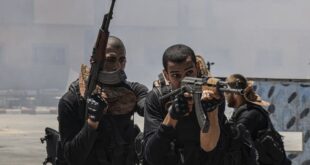![news3_5_3[1].jpg news3_5_3[1].jpg](https://eurasia.ro/wp-images/uploads/2006/03/news3_5_3[1].jpg) RAMALLAH — Hamas leaders on an official visit to Moscow yesterday called talks with the Russian government an “important breakthrough” and rejected pressure on the group to recognise Israel.
RAMALLAH — Hamas leaders on an official visit to Moscow yesterday called talks with the Russian government an “important breakthrough” and rejected pressure on the group to recognise Israel.
In Nazareth, meanwhile, thousands marched through the city Saturday afternoon protesting an incident Friday when an Israeli, his wife and daughter set off fireworks in the Church of Annunciation causing a fire and minor damage to the church.
Christian and Muslim Palestinian-Israeli leaders all denounced the Israeli government’s handling of the incident, which on Friday triggered riots that resulted in the injury of 13 police officers and 13 residents.
According to the Israeli police, the Jewish man, Haim Eliyahu Habibi, 44, had a history of mental illness, and Israeli officials were at pains to deny that the assailants were linked to any ultranationalist Jewish group.
Friday evening, Habibi, his Christian wife and their daughter hid fireworks and small gas canisters in a baby stroller and detonated the fireworks inside the church during a special prayer for the opening of Lent. They were disguised as Christian pilgrims.
The church is built at the site of the Annunciation, where according to Christian faith, the Virgin Mary was told by the archangel Gabriel she had been chosen by God to bear His son, Jesus.
A witness said the church was crowded with worshippers praying for the coming Easter holiday at the time of the attack.
“We heard a boom. It went on for six or seven minutes,” she told news agencies. “I thought we were going to die.”
Israeli Public Security Minister Gideon Ezra said the attack did not appear to have nationalist motivations and that he had been in touch with local Christian leaders to calm the tensions. “It is very important to put out this small flame so that won’t become a huge fire,” he told Israeli TV.
But Palestinian-Israeli leaders were not at all satisfied with the official Israeli reaction. “The issue is not who carried out yesterday’s attack in Nazareth, but rather who is next in line. All of these criminals are known to security officials, who bear the responsibility of arresting them and preventing further attacks on the Arab public,” said member of the Israeli parliament, Mohammad Barakeh.
Habibi, who was known to the Israeli security services, had made threats in the past to attack churches.
Another member of the Israeli parliament, Ahmed Tibi, said the incident was evidence of widespread racism against Palestinians and Arabs in Israeli society.
“Why is it that when a Jewish extremist goes crazy, he burns a mosque or blows up a church? This is a sickness of racism and hatred of Arabs, Muslims and Christians alike.”
That too was the message from Palestinian prime minister-designate, Hamas’ Ismail Haniyeh, who said the incident was a result of “a hate culture which Israel is feeding its public against the Palestinians, and their Christian and Islamic holy places and believers.”
Habibi is to face criminal charges Sunday, when the Israeli Cabinet will also discuss the incident.
In Moscow, meanwhile, Hamas officials hailed meetings with Russian officials as a significant breakthrough in its diplomatic efforts despite not securing a top level meeting between Russian President Vladimir Putin and Hamas leader-in-exile, Khaled Mishaal.
Mishaal said Saturday that Russia could be a significant force in promoting stability in the Middle East. But he didn’t back down from the group’s position not to recognise Israel, a demand made of Hamas by the international community ever since the group won January’s Palestinian legislative elections.
“If Israel officially announces its readiness to withdraw from all territories occupied in 1967, the return of Palestinian refugees, the closure of settlements, the dismantling of the dividing wall, the release of all prisoners, then our movement will take a big step toward peace,” he said.
“There can be no peace if the occupation continues.”
On Friday, Russian Foreign Minister Sergei Lavrov had told the Hamas delegation during a first day of talks it must recognise Israel’s right to exist and abide by interim peace deals, echoing demands made by the Quartet of Middle East mediators, which besides Russia includes the UN, the United States and the EU.
But yesterday, Musa Abu Marzouk, Hamas’ spokesman, told Reuters in an interview that recognising Israel would negate all Palestinian rights.
“I gave the Russian officials a white sheet and I asked them to draw me a map of the Israel they want me to recognise and nobody was able to draw the map,” Abu Marzouk said. “How would you want me to recognise something that is so dangerous to the future of the Palestinian people?”
Saturday, the Hamas delegation also met with the head of Russia’s Council of Muftis, Ravil Gainutdin, head of the Russian Orthodox Church, Patriarch Alexei II, and Arab and other Muslim business leaders in Moscow.
The United States and the EU have threatened to cut funding to the Palestinian Authority unless Hamas meet their demands to recognise Israel and renounce the armed resistance, and Hamas’ visit to Moscow, after an invitation from Putin, was met with fierce criticism in Washington, which is hoping to isolate the group internationally.
 Eurasia Press & News
Eurasia Press & News
